Two years ago our amazing Beatson Cancer Charity ambassadors Todd Whiteford and best friend Ross Mackay embarked on a gruelling challenge of lifetime to the Sahara. This is Todd's inspiring story on how he went through his treatment at the Beatson and how he unleashed his 'wild side' to go that one step further!
Salty tears flowed down my cheeks, which were covered in Saharan sand. One of the things that struck me at the time was how salty these tears were - I felt so dehydrated that when I started crying that I wondered if I would get any tears at all. The whole moment was very surreal: I was standing in the middle of the Sahara desert, the midday sun accelerating the ambient temperature to over 40°C, crying my eyes out at the finish line of the 151 mile Marathon des Sables to the soundtrack of 'Hurricane' by Bob Dylan playing over the speaker system.
I was surrounded by elated runners all having completed their own challenge, having been on their own emotional journey. I'm not a big crier. Not at all. I couldn't remember the last time that I had cried - over anything - and I don't think I have ever felt such a release of emotion before. One of my best friends and running partner, Ross, put a reassuring hand on my shoulder (although I knew he'd be memorising this moment to use as ammo with which to embarrass me further down the line.
It's okay - I would do the same to him). And of course, there's nothing to be embarrassed about. 'Strong men also cry' as the Big Lebowski put it.
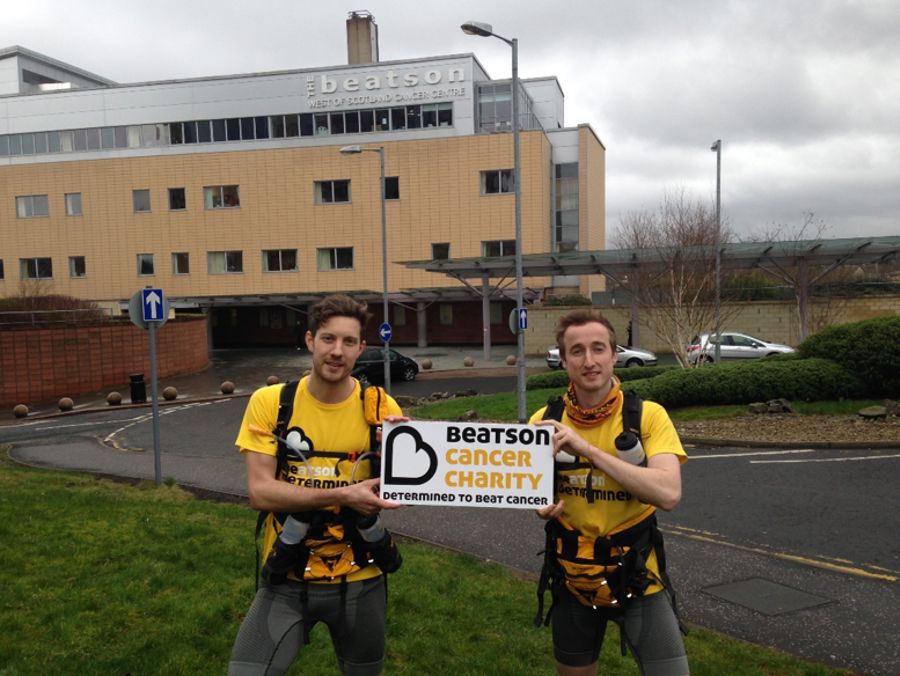
Just twelve months earlier I had been sitting in a quiet doctor’s surgery, not crying, while being told by the consultant that I had testicular cancer. That was very sudden: I was 28 years old, fit as a fiddle and barely had a care in the world. Funnily enough, one of the first things that struck me was: "When will I be able to get out in the hills again?” Before that point I had been hiking up and down Scotland's Munros as a hobby, just for something to pass the time on my mid-week days off. All of my friends were working 9-5 Monday to Friday, and at the time I was working shifts as a barista in a West End coffee shop so would often have a Tuesday or Wednesday off with no pals to adventure with - so I started taking myself on wee trips up North to explore the mountains and got a fair bit of enjoyment out of that. I did, however, think it a bit weird that it would come to the forefront of my mind at that particular time.
Family and friends, yes of course I thought about them first - but trips to the hills basically to hike around and eat sandwiches? Why would that be the next thing on my mind? If you had asked me I don't think I would have told you that these forays into the wild were at the core of what made me tick, but I suppose it often takes a more extreme set of circumstances to gain valuable perspective on things: on life, on what's important to you and what isn't - what makes you happy. For me it turned out that these adventures actually were a much bigger part of what I'm all about. They lie at the heart of what really makes me feel alive.
I'm pretty up front about my cancer experience. I often describe it as a 'brush' with cancer - there are definitely people who have had much more serious cancer than me, have been far braver, and have had to talk about it far less than I do. Testicular cancer has a 98% survival rate and with early detection the chance of the cancer spreading is greatly reduced. The key is to detect it early with regular self examination and GP visits if there is any doubt. Men are, historically, maybe not the best at looking after themselves - especially with problems in this region of the body, but I'm hoping that this is changing. The modern man should be much more aware of his health, much more ready to admit fear and anxiety over these issues. We just need to be talking about this openly.
So, while I know I had a lucky-ish escape (let's not forget I did have to have one of my balls chopped off), the experience was still a very important one in my life. I took a physical and mental knock. The surgery healed quickly, but chemotherapy is no fun whatsoever. A single dose made it difficult for me to do two things that I'm usually pretty good at - eating and sleeping - and I am in awe of how tough the people are who have to keep going back for dose after dose. In the grand scale of things, I was physically fit again relatively quickly, and after a short time I felt stronger than ever. I also found that mentally I was pretty resilient. Ups and downs, sure, but I was feeling much more appreciative of my health, my circumstances, my family, friends, but also - I was fired up. And so the timing of a phone call from one of my best friends couldn't have been better...
"Mate - I think I can get us in" said Ross excitedly down the phone. I was walking down Great Western Road in Glasgow, still shaking off the limp a little from the surgery "I've just spoken to Sarah and she has a couple of spaces left for next year's Marathon des Sables".
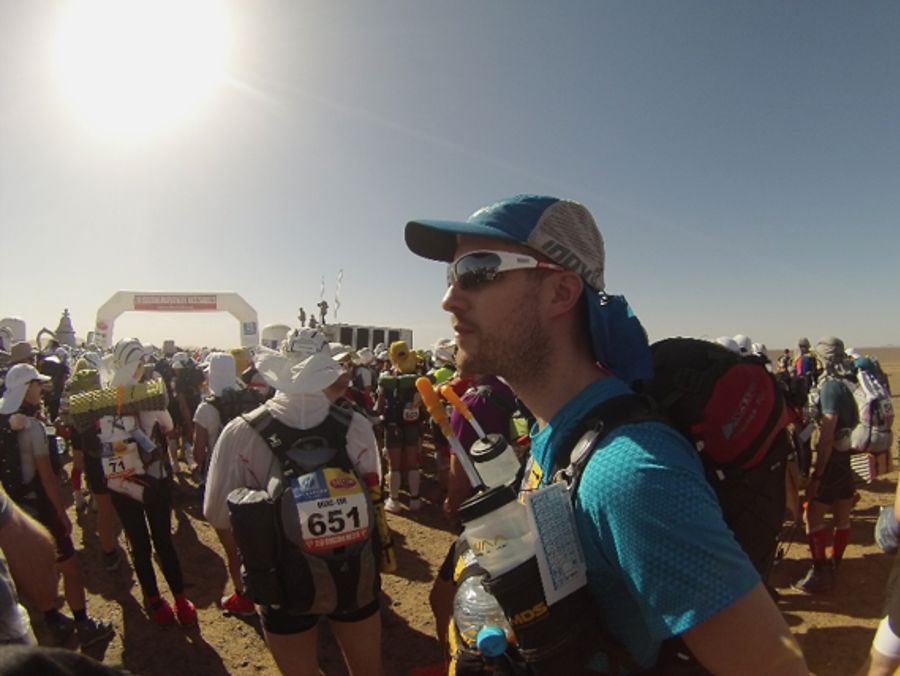
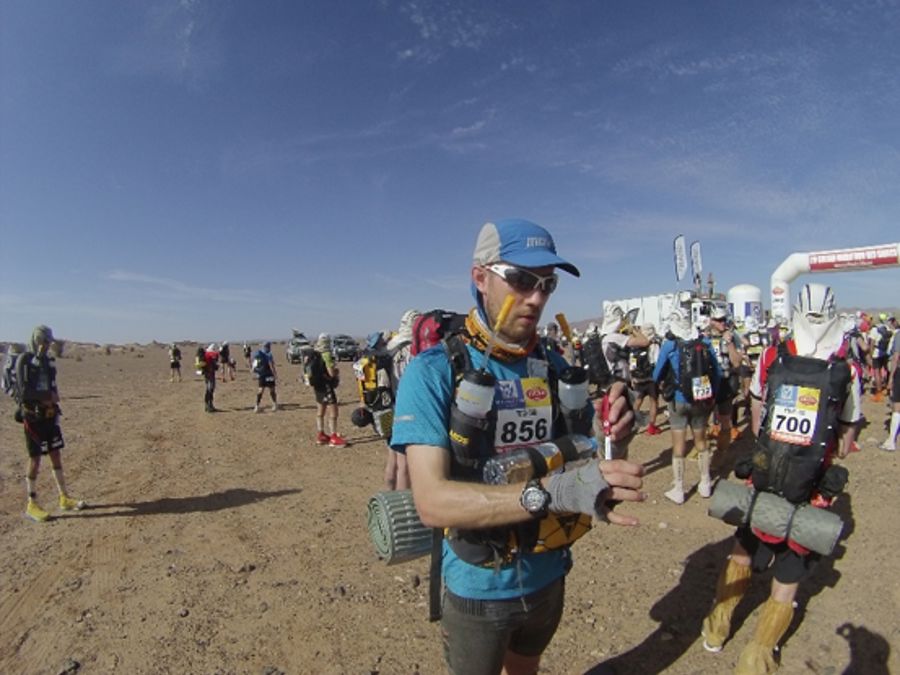
The Marathon des Sables is considered the toughest footrace in the world. It is a multi-stage race that takes place in the Moroccan Sahara desert over five days. Participants are required to be self sufficient - the only thing provided is water (at checkpoints throughout the race), and a tent that is shared between 8 runners. Runners have to carry all of their food for the week, as well as medical kit and an emergency flare. Packs weigh between 10-15kg. One of the stages is a double-marathon which runs overnight, with some participants returning to camp having been trekking through the desert for 24 hours or more. Temperatures in the middle of the day reach over 40°C and it is not uncommon for runners to suffer from dehydration, heat exhaustion or hyponatraemia. In 2014, the year that we took part, the event experienced the second highest drop-out rate in its history. Two runners were emergency airlifted to the nearest hospital; one was put in an induced coma. It is a very difficult race.
We had been talking about the Marathon des Sables in a 'wouldn't it be crazy even to try to do this' kind of way since 2006, when our credentials extended only to having completed the West Highland Way once. To us, the MDS was the pinnacle of toughness, the ultimate adventure. We weren't marathon runners - we weren't really runners of any kind so it was an event that we thought might be beyond us - but the thought of that was so exciting to us.
The idea of a 'test'. Could we really make it through the Sahara? Could we even make it to the Sahara? The training itself would be an enormous undertaking and would require discipline that we'd never had to have before. Could we really complete six marathons in five days? In temperatures so high - we were from Scotland after all. We wanted answers to these questions and more, and there was only one way to find out. The fire had been lit - and fire rises!
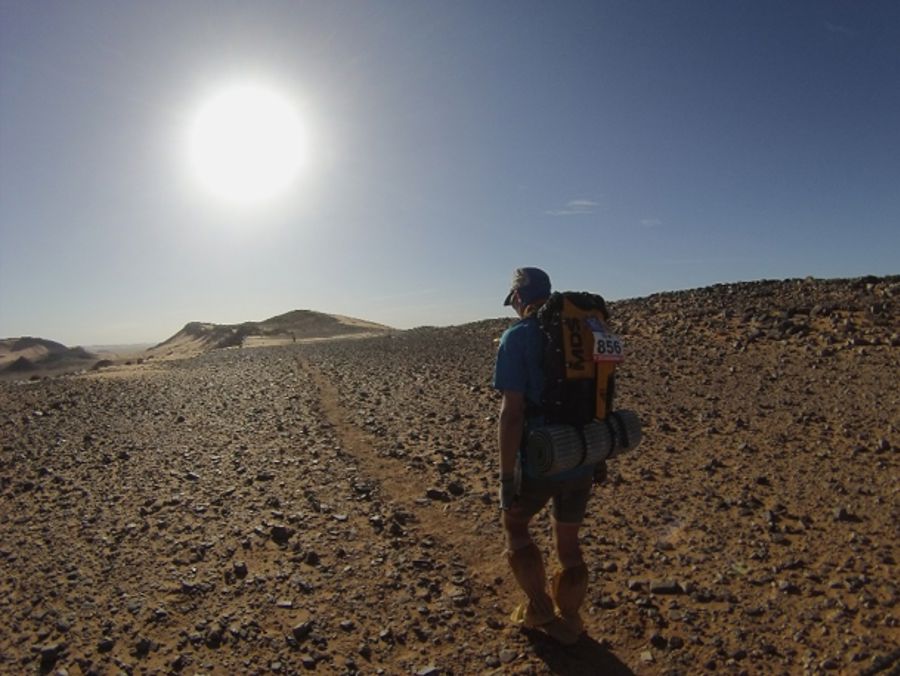
Preparations for the MDS began in earnest. Much of that involved, as you can imagine, a lot of running. I think by the end of our training we had clocked up well over two thousand kilometres of running. Many people have said that the key to completing the MDS is good 'race management' - so a huge part of the preparation is to do with selecting the right clothing, gear, food, sleeping bag, cooking equipment, toiletries and so on - which is not my strong suit. I had been used to the 'let's just get out there and it'll be fine' approach to adventuring and without Ross, I'm not sure how far my usual glass bottle of Irn Bru and four pack of jam doughnuts would have got me this time. Time passed and I did learn to love the kit prep. I will even admit (through gritted teeth) that I, like many others, did get a little thrill when the opportunity arose to test out a new water bottle, or high tech socks, or scientifically engineered pants.
To keep us on the right track in the months leading up to the race, we partnered up with Beatson Cancer Charity in Glasgow to raise awareness of the work they do with cancer patients and to raise some money for them. The Beatson Cancer Centre serves half the population of Scotland - about 2.5 million people. I spent only a little while at The Beatson when I had cancer, but even in that short time I was very impressed at the level of care provided and the amazing commitment that the staff show to create a positive, encouraging and sympathetic environment for patients and their loved ones. Myself and Ross continue to be ambassadors for the charity, and would thoroughly recommend checking out some of the great work they are doing. In the end we raised over £7000 for The Beatson. We knew that we would face some dark moments in the desert and the idea that we were doing this not just for ourselves, but for a bigger reason, was something that we knew we could draw on for motivation.
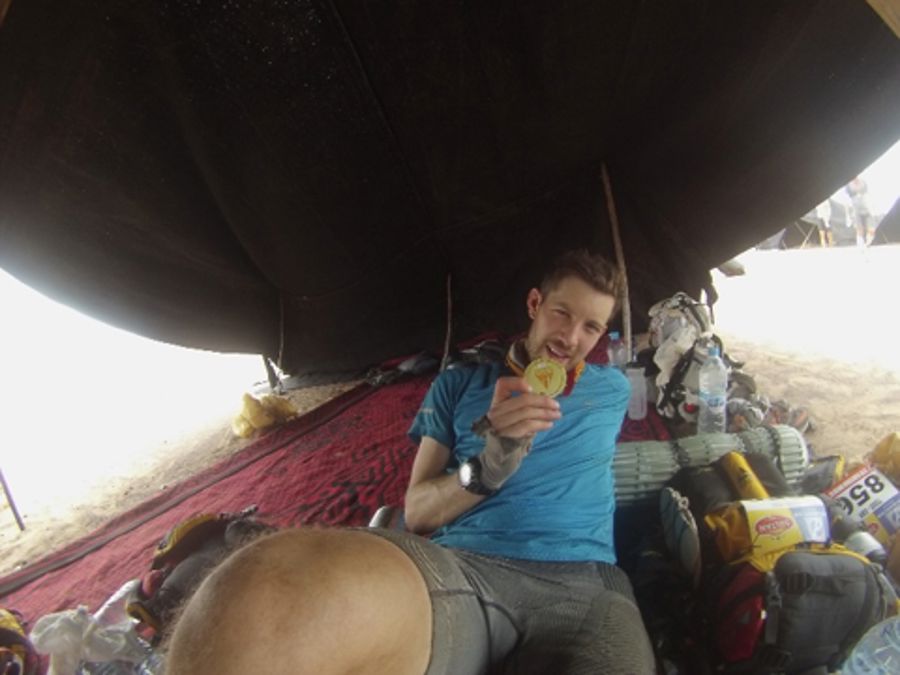
Motivation came from many different sources in the desert. It could come from a small thing, like one day we found out we'd all be getting a can of Coke, to a really big thing - like Mike. Mike was an older gent that I met in the queue for the water station one morning. We got chatting and he told me about his triathlon and Iron Man achievements. He came across as one of these tough old guys who would eat this kind of event for breakfast. He told me he was running the MDS this year because he wasn't sure if he'd still be around next year. Aside from having had a stroke and a bad bike accident, Mike had leukaemia. Against doctors orders he was out in the desert, running this hard-as-nails race, taking chemotherapy tablets every night. That stopped me in my tracks. I couldn't believe it. When I got back to the tent and told the others, they couldn't believe it. We knew how tough we were finding it, so we literally could not imagine how tough it would have been for him. Managing your water and calorie intake during the race is so important, and to add doses of chemotherapy to that equation just seems like insanity. From that point on, I'm sure Mike's story popped into our heads from time to time at tough moments and spurred us on. It definitely did for me. Sure enough, some of us saw Mike in the airport on the way back to the UK - upbeat and chatty and seemingly with some amount of energy still left!
We ran across dry river beds, over sandy plains, hiked up jebels and raced down enormous sand dunes for over 150 miles and before we knew it we had come to the end, and we had done it. We finished in the top 400 from a field of 1400, but that didn't really matter. What was more valuable, more important was this idea that we could just set out on a path so difficult and return victorious was amazing, given the circumstances I was in only the same time the previous year. In twelve months I had gone from feeling the most vulnerable I had ever felt in my life to feeling invincible.
Completing the MDS stretched my perception of what is possible for the 'ordinary' man (or woman). With a positive attitude and the support of loved ones, it is possible to achieve more than you imagined. This is where a contradiction comes into play. I think it was the wild side in me that drove me to commit to this event, and was bloody minded and adventurous enough in spirit to ignite the fire for this toughest of races. But what made me actually complete the event was the motivation I got from my wife, the support of my family and friends, the encouragement of my tent mates, the inspiring words from Ross at times of need. There's nothing 'wild' about that - that's a human thing: the desire to connect and be loved and have a nice cup of tea and sit by the fire, and I think it kind of reinforces this idea of everything in equilibrium. It's not that the wild side can't exist without the human side - I think the wild side makes the human side better, and vice versa. It is the 'wild' side which drives you to get out there and have adventures, to embrace the elements, try something difficult and gamble a little on uncertainty. But it is the human side which keeps you safe, and motivates you to adventure well, so that you can come home every time and share those adventures with others.
I am by no means the oracle when it comes to life, or cancer, or adventure (or anything really) but if I had a parting message I would wholeheartedly encourage everyone to embrace and unleash the wild side within themselves, whatever that means to you. Whether that's exploring in the woods, jumping in the sea, hiking an unknown trail, conquering a Munro, or indeed - running across the desert.
Just don't forget the human side - it's the side that brings you home safe...
You can follow my adventures on Instagram: @foxcubadventures




 Donate
Donate